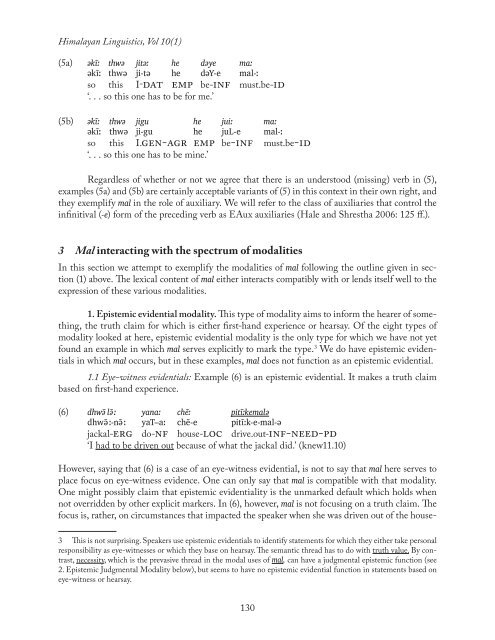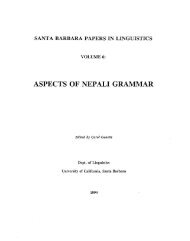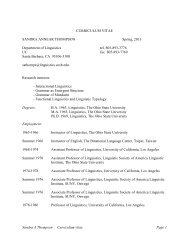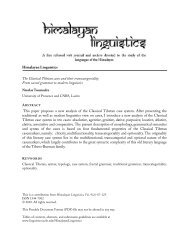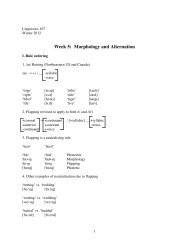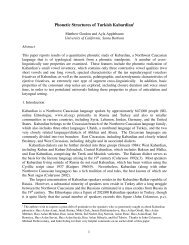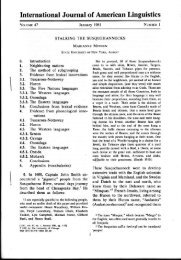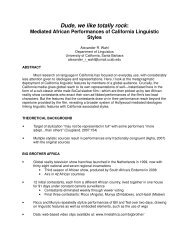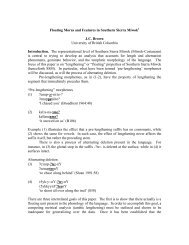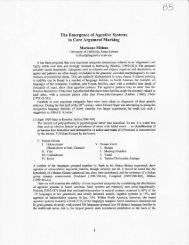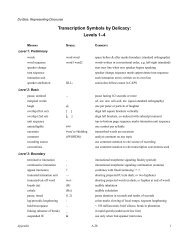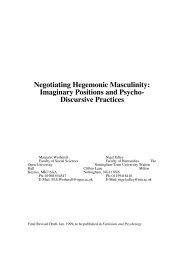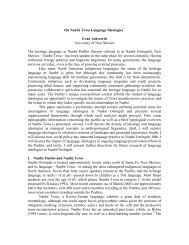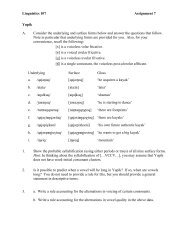- Page 1 and 2:
volume 10 number 1 June 2011 himala
- Page 3:
Himalayan Linguistics Volume 10, Nu
- Page 7:
Michael Noonan in Nepal, sitting wi
- Page 10 and 11:
Himalayan Linguistics, Vol 10(1) Fi
- Page 12 and 13:
Himalayan Linguistics, Vol 10(1) Mi
- Page 14 and 15:
Himalayan Linguistics, Vol 10(1) Re
- Page 16 and 17:
Himalayan Linguistics, Vol 10(1) 20
- Page 18 and 19:
Himalayan Linguistics, Vol 10(1) 19
- Page 21 and 22:
Works by David Watters Books Forthc
- Page 23:
xxi Works by David Watters 2006.
- Page 26 and 27:
Himalayan Linguistics, Vol 10(1) La
- Page 28 and 29:
Himalayan Linguistics, Vol 10(1) Th
- Page 30 and 31:
Himalayan Linguistics, Vol 10(1) Is
- Page 33 and 34:
Himalayan Linguistics, Vol. 10(1).
- Page 35 and 36:
DeLancey: Verb agreement prefixes i
- Page 37 and 38:
DeLancey: Verb agreement prefixes i
- Page 39 and 40:
(6) amh bəyʔ-ne-wʔ food give-NON
- Page 41 and 42:
Singular Plural 1 maʔ-niŋ maʔ-nu
- Page 43 and 44:
(20) mín-rhê-reŋ-áŋ-cê 1OBJ
- Page 45 and 46:
DeLancey: Verb agreement prefixes i
- Page 47 and 48:
DeLancey: Verb agreement prefixes i
- Page 49 and 50:
DeLancey: Verb agreement prefixes i
- Page 51 and 52:
DeLancey: Verb agreement prefixes i
- Page 53 and 54:
DeLancey: Verb agreement prefixes i
- Page 55 and 56:
DeLancey: Verb agreement prefixes i
- Page 57 and 58:
DeLancey: Verb agreement prefixes i
- Page 59 and 60:
DeLancey: Verb agreement prefixes i
- Page 61:
DeLancey: Verb agreement prefixes i
- Page 64 and 65:
Himalayan Linguistics, Vol 10(1) wh
- Page 66 and 67:
Himalayan Linguistics, Vol 10(1) fo
- Page 68 and 69:
Himalayan Linguistics, Vol 10(1) un
- Page 70 and 71:
Himalayan Linguistics, Vol 10(1) Th
- Page 73 and 74:
Himalayan Linguistics, Vol. 10(1).
- Page 75 and 76:
43 Eppele: Language use among the B
- Page 77 and 78:
Figure 2. Language 9 areas by VDC 4
- Page 79 and 80:
47 Eppele: Language use among the B
- Page 81 and 82:
49 Eppele: Language use among the B
- Page 83 and 84:
51 Eppele: Language use among the B
- Page 85 and 86:
53 Eppele: Language use among the B
- Page 87 and 88:
Himalayan Linguistics, Vol. 10(1).
- Page 89 and 90:
Genetti: Direct speech reports and
- Page 91 and 92:
Genetti: Direct speech reports and
- Page 93 and 94:
Genetti: Direct speech reports and
- Page 95 and 96:
5.1 Intonation-unit boundaries Gene
- Page 97 and 98:
Genetti: Direct speech reports and
- Page 99 and 100:
Genetti: Direct speech reports and
- Page 101 and 102:
Genetti: Direct speech reports and
- Page 103 and 104:
(16) a. haŋ-ane // say-part Genett
- Page 105 and 106:
Genetti: Direct speech reports and
- Page 107 and 108:
Genetti: Direct speech reports and
- Page 109 and 110:
Himalayan Linguistics, Vol. 10(1).
- Page 111 and 112: Greninger: Another look at storylin
- Page 113 and 114: # Info Type Surface Marking Grening
- Page 115 and 116: down - place -for HES HES HES house
- Page 117 and 118: Greninger: Another look at storylin
- Page 119 and 120: kja¹ mi² -nok" woɾu, tɑŋ² kʰ
- Page 121 and 122: 9 Background Activities Greninger:
- Page 123 and 124: and.then + sun/day after (21) SICK
- Page 125 and 126: carry -IMS soldier PL =DAT friend n
- Page 127 and 128: Greninger: Another look at storylin
- Page 129 and 130: Greninger: Another look at storylin
- Page 131: Greninger: Another look at storylin
- Page 134 and 135: Himalayan Linguistics, Vol 10(1) an
- Page 136 and 137: Himalayan Linguistics, Vol 10(1) (1
- Page 138 and 139: Himalayan Linguistics, Vol 10(1) Th
- Page 140 and 141: sing-ATT.NMZ young.man-PL village-C
- Page 142 and 143: Himalayan Linguistics, Vol 10(1) (1
- Page 144 and 145: D.DEM-DEF-ERG little.bit-little.bit
- Page 146 and 147: Himalayan Linguistics, Vol 10(1) (2
- Page 148 and 149: Himalayan Linguistics, Vol 10(1) 3.
- Page 150 and 151: Himalayan Linguistics, Vol 10(1) (3
- Page 152 and 153: (37) (a) *kurc-ya bɦormi stingy- S
- Page 154 and 155: ‘He is always late.’ (S) (b) ho
- Page 156 and 157: Himalayan Linguistics, Vol 10(1) S
- Page 158 and 159: Himalayan Linguistics, Vol 10(1) No
- Page 160 and 161: Himalayan Linguistics, Vol 10(1) 1
- Page 164 and 165: Himalayan Linguistics, Vol 10(1) pi
- Page 166 and 167: Himalayan Linguistics, Vol 10(1) In
- Page 168 and 169: Himalayan Linguistics, Vol 10(1) Th
- Page 170 and 171: Himalayan Linguistics, Vol 10(1) In
- Page 172 and 173: Himalayan Linguistics, Vol 10(1) (4
- Page 174 and 175: Himalayan Linguistics, Vol 10(1) ch
- Page 176 and 177: Himalayan Linguistics, Vol 10(1) ji
- Page 178 and 179: Himalayan Linguistics, Vol 10(1) (6
- Page 180 and 181: Himalayan Linguistics, Vol 10(1) th
- Page 182 and 183: Himalayan Linguistics, Vol 10(1) Pa
- Page 184 and 185: Himalayan Linguistics, Vol 10(1) bo
- Page 186 and 187: Himalayan Linguistics, Vol 10(1) ab
- Page 188 and 189: Himalayan Linguistics, Vol 10(1) (i
- Page 190 and 191: Himalayan Linguistics, Vol 10(1) th
- Page 192 and 193: Himalayan Linguistics, Vol 10(1) le
- Page 194 and 195: Himalayan Linguistics, Vol 10(1) Er
- Page 196 and 197: Himalayan Linguistics, Vol 10(1) Re
- Page 199 and 200: Himalayan Linguistics, Vol. 10(1).
- Page 201 and 202: 3 Lexical correspondences with regi
- Page 203 and 204: 3.2 Distinguishing features of Gyal
- Page 205 and 206: Hildebrandt and Perry: Preliminary
- Page 207 and 208: Chart 2. Average Initial-Syllable V
- Page 209 and 210: Chart 5. Average Vowel Intensity (d
- Page 211 and 212: Hildebrandt and Perry: Preliminary
- Page 213 and 214:
Hildebrandt and Perry: Preliminary
- Page 215 and 216:
Hildebrandt and Perry: Preliminary
- Page 217:
Verbs Hildebrandt and Perry: Prelim
- Page 220 and 221:
Himalayan Linguistics, Vol 10(1) Fi
- Page 222 and 223:
Himalayan Linguistics, Vol 10(1) na
- Page 224 and 225:
Himalayan Linguistics, Vol 10(1) ma
- Page 226 and 227:
Himalayan Linguistics, Vol 10(1) (w
- Page 228 and 229:
Himalayan Linguistics, Vol 10(1) Mo
- Page 230 and 231:
Himalayan Linguistics, Vol 10(1) 48
- Page 232 and 233:
Himalayan Linguistics, Vol 10(1) On
- Page 234 and 235:
Himalayan Linguistics, Vol 10(1) No
- Page 236 and 237:
Himalayan Linguistics, Vol 10(1) (1
- Page 238 and 239:
Himalayan Linguistics, Vol 10(1) Wh
- Page 240 and 241:
Himalayan Linguistics, Vol 10(1) re
- Page 242 and 243:
Himalayan Linguistics, Vol 10(1) ap
- Page 244 and 245:
Himalayan Linguistics, Vol 10(1) 5.
- Page 246 and 247:
Himalayan Linguistics, Vol 10(1) In
- Page 248 and 249:
Himalayan Linguistics, Vol 10(1) Ba
- Page 250 and 251:
Himalayan Linguistics, Vol 10(1) 3.
- Page 252 and 253:
Himalayan Linguistics, Vol 10(1) ap
- Page 254 and 255:
Himalayan Linguistics, Vol 10(1) 56
- Page 256 and 257:
Himalayan Linguistics, Vol 10(1) Ap
- Page 259 and 260:
Himalayan Linguistics, Vol. 10(1).
- Page 261 and 262:
229 Lee: Issues in Bahing orthograp
- Page 263 and 264:
231 Lee: Issues in Bahing orthograp
- Page 265 and 266:
(5) [ˈb̤luʔƃa] ; [ˈjoʔƃa]
- Page 267 and 268:
235 Lee: Issues in Bahing orthograp
- Page 269 and 270:
237 Lee: Issues in Bahing orthograp
- Page 271 and 272:
239 Lee: Issues in Bahing orthograp
- Page 273 and 274:
241 Lee: Issues in Bahing orthograp
- Page 275 and 276:
(28) Words with Contrastive Short a
- Page 277 and 278:
245 Lee: Issues in Bahing orthograp
- Page 279 and 280:
247 Lee: Issues in Bahing orthograp
- Page 281 and 282:
249 Lee: Issues in Bahing orthograp
- Page 283 and 284:
4 Reflections 251 Lee: Issues in Ba
- Page 285 and 286:
Himalayan Linguistics, Vol. 10(1).
- Page 287 and 288:
255 Opgenort: Tilung and its positi
- Page 289 and 290:
257 Opgenort: Tilung and its positi
- Page 291 and 292:
PK Hayu Sunwar Bahing Jero Wambule
- Page 293 and 294:
Bahing po, Wambule pa, Dumi poʔo T
- Page 295 and 296:
263 Opgenort: Tilung and its positi
- Page 297 and 298:
265 Opgenort: Tilung and its positi
- Page 299 and 300:
hear Gloss lie down one PK Hayu Sun
- Page 301 and 302:
269 Opgenort: Tilung and its positi
- Page 303:
271 Opgenort: Tilung and its positi
- Page 306 and 307:
Himalayan Linguistics, Vol 10(1) Th
- Page 308 and 309:
Himalayan Linguistics, Vol 10(1) 2.
- Page 310 and 311:
Himalayan Linguistics, Vol 10(1) (9
- Page 312 and 313:
Himalayan Linguistics, Vol 10(1) (1
- Page 314 and 315:
Himalayan Linguistics, Vol 10(1) (2
- Page 316 and 317:
Himalayan Linguistics, Vol 10(1) (3
- Page 318 and 319:
Himalayan Linguistics, Vol 10(1) 3.
- Page 320 and 321:
Himalayan Linguistics, Vol 10(1) Fi
- Page 322 and 323:
Himalayan Linguistics, Vol 10(1) Si
- Page 324 and 325:
Himalayan Linguistics, Vol 10(1) re
- Page 326 and 327:
Himalayan Linguistics, Vol 10(1) (1
- Page 328 and 329:
Himalayan Linguistics, Vol 10(1) (1
- Page 331 and 332:
Himalayan Linguistics, Vol. 10(1).
- Page 333 and 334:
301 Bergqvist: Review of Chelliah a


